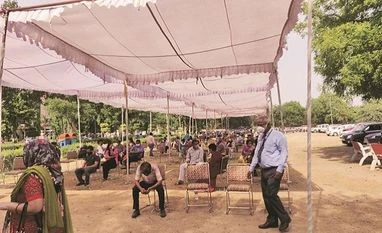When 35-year-old Pawan Pahadia registered for a dose of Covaxin at Fortis Hospital in South Delhi, he didn’t expect to go for the vaccination the following day without his wife and brother. “I’ve been trying for the past three days. Luckily, I got a slot for myself but I was unable to book one for my family,” he says, adding, “I had promised my wife that we would take the vaccine together.”
Recalling how his daughter started crying when she got to know that he was going for the vaccination without her mother, Pahadia says, “She is just 10 years old; she is very worried about her mother.” Like many, he is disappointed by the government’s inability to provide enough vaccines in the national capital.
While the staff at Fortis admit that the number of daily vaccinations has declined by over 30-40 per cent from their daily average of 250 doses during this week, they choose not to comment on vaccine shortage.
On Friday, Delhi Health Minister Satyendar Jain again sent an SOS to the central government — the second time in less than a week — amid an acute shortage of Covid vaccines. He said that Covaxin stock had almost finished in the capital, while the Covishield stock would last only for two or three days for people in the 18 to 44 age group.
Like Pahadia, Santosh Singh, an engineer with an MNC, has been trying for a week to register for vaccination but has failed to get a slot. “Despite several attempts, I’m not able to register. I fill all the details but in the end it shows some error and I am back to square one,” says Singh.
Thousands of Delhiites like Pahadia and Singh are facing the same problem in registering online for vaccine slots for themselves and their loved ones.
At the Delhi government-run Institute of Liver and Biliary Sciences (ILBS), which is administering Covishield to people aged above 45 and those employed in essential services, hundreds are waiting for vaccination coupons under a tent. Chandan Gupta, casualty medical officer, ILBS, says, “We have stopped walk-in vaccination because we are running low on vaccines. We fall behind by over 30 per cent in our daily average target of 1,000 vaccinations.”
Radhika Dev and Arun Dev, both in their 60s, reached the vaccination centre at 10 am, but got the jab only at 2 pm. “Given our age, it is exhausting to sit for such long hours, but at least we got vaccinated,” says Radhika Dev.
Ayaan (he gives only his first name), a 23-year-old architect, had to take a day off from work to get his mother vaccinated. He is happy when she calls to say she has got the jab. He’s been trying to register for a vaccine for himself and his siblings as well, but hasn’t been successful. “I hope the Delhi and the central governments come together to save people rather than engaging in politics,” he says, adding, “We were more worried about our mother than ourselves. Now we will be able to have a good night’s sleep.”
Since the hospital has stopped walk-in vaccination, those who have come without booking a slot return dejected. Jasvinder Kumar and his colleagues, who are employed with ICICI Bank, have come to the hospital without an appointment after they received a mail from their office to get vaccinated. They turn back disappointed when the guard tells them that they first need to book a slot through the CoWIN app. “Our work involves public dealing but we are unable to get vaccinated,” Kumar says.
The hospital runs 24x7 and had earlier vaccinated everyone who had registered, but now because of supply shortage doing so has become difficult. As a result, the job of B N Jha, security supervisor at the hospital, has become tougher. “When my staff tells them that there are no vaccines left, people get angry but what can we do? If the hospital doesn’t have vaccines, how can I give them a vaccine coupon?” says Jha, as he requests people to understand that there is a shortage.
The situation at the central government-run All India Institute of Medical Sciences (AIIMS), which is administering vaccines to people aged 45 and above, seems better. People with whom Business Standard interacted in the waiting area said they had no problem registering.
Amid the shortage of vaccines, the Centre has increased the gap between two doses of Covishield to 12-16 weeks. Earlier, it was six to eight weeks. The UK has already done this after clinical evidence for the Covishield vaccine showed better efficacy following a 12-week gap. There is hope that the wider gap will also give a window to meet the supply shortage. But the residents of Delhi feel this is not a solution to their worries. They wish for the central and state governments to join hands and work towards mitigating the problem and save Delhi from this crisis.
Unlock 30+ premium stories daily hand-picked by our editors, across devices on browser and app.
Pick your 5 favourite companies, get a daily email with all news updates on them.
Full access to our intuitive epaper - clip, save, share articles from any device; newspaper archives from 2006.
Preferential invites to Business Standard events.
Curated newsletters on markets, personal finance, policy & politics, start-ups, technology, and more.
)